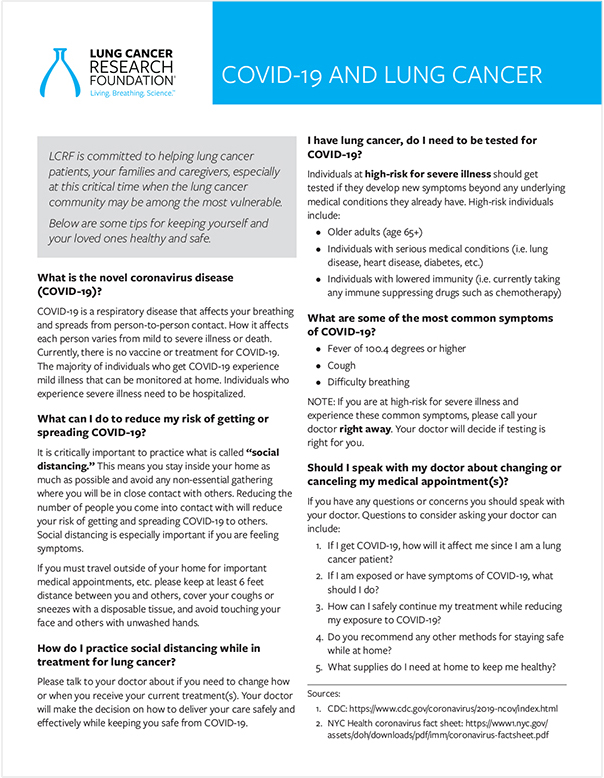
The information below is available as a free download.
View a joint statement from LCRF and other lung cancer groups: lcrf.org/coronavirus.
Sign up for a virtual conversation about COVID-19 and you on Thursday, March 26 at 12 PM EDT: lcrf.org/together.
LCRF is committed to helping lung cancer patients, your families and caregivers, especially at this critical time when the lung cancer community may be among the most vulnerable. Below are some tips for keeping yourself and your loved ones healthy and safe.
What is the novel coronavirus disease (COVID-19)?
COVID-19 is a respiratory disease that affects your breathing and spreads from person-to-person contact. How it affects each person varies from mild to severe illness or death. Currently, there is no vaccine or treatment for COVID-19. The majority of individuals who get COVID-19 experience mild illness that can be monitored at home. Individuals who experience severe illness need to be hospitalized.
What can I do to reduce my risk of getting or spreading COVID-19?
It is critically important to practice what is called “social distancing.” This means you stay inside your home as much as possible and avoid any non-essential gathering where you will be in close contact with others. Reducing the amount of people you come into contact with will reduce your risk of getting and spreading COVID-19 to others. Social distancing is especially important if you are feeling symptoms.
If you must travel outside of your home for important medical appointments, etc. please keep at least 6 feet distance between you and others, cover your coughs or sneezes with a disposable tissue, and avoid touching your face and others with unwashed hands.
How do I practice social distancing while in treatment for lung cancer?
Please talk to your doctor about if you need to change how or when you receive your current treatment(s). Your doctor will make the decision on how to deliver your care safely and effectively while keeping you safe from COVID-19.
I have lung cancer, do I need to be tested for COVID-19?
Individuals at high-risk for severe illness should get tested if they develop new symptoms beyond any underlying medical conditions they already have. High-risk individuals include:
- Older adults (age 65+)
- Individuals with serious medical conditions (i.e. lung disease, heart disease, diabetes, etc.)
- Individuals with lowered immunity (i.e. currently taking any immune suppressing drugs such as chemotherapy, etc.)
What are some of the most common symptoms of COVID-19?
- Fever of 100.4 degrees or higher
- Cough
- Difficulty breathing
NOTE: If you are at high-risk for severe illness and experience these common symptoms please call your doctor right away. Your doctor will decide if testing is right for you.
Should I speak with my doctor about changing or canceling my medical appointment(s)?
If you have any questions or concerns you should speak with your doctor. Questions to consider asking your doctor can include:
- If I get COVID-19, how will it affect me since I am a lung cancer patient?
- If I am exposed or have symptoms of COVID-19, what should I do?
- How can I safely continue my treatment while reducing my exposure to COVID-19?
- Do you recommend any other methods for staying safe while at home?
- What supplies do I need at home to keep me healthy?
Sources:
- CDC: https://www.cdc.gov/coronavirus/2019-ncov/index.html
- NYC Health coronavirus fact sheet: https://www1.nyc.gov/assets/doh/downloads/pdf/imm/coronavirus-factsheet.pdf
Please note that the information presented here is not intended to substitute for medical advice provided by your healthcare team. We encourage you to speak with your doctor or nurse about your specific health questions or concerns.
Page last updated March 25, 2020
